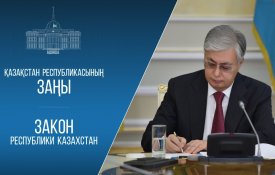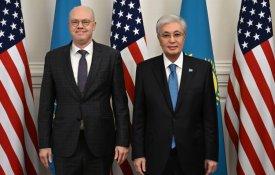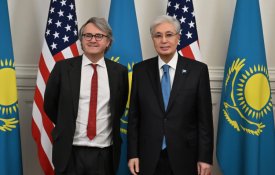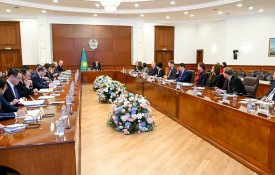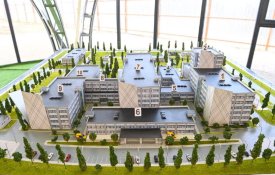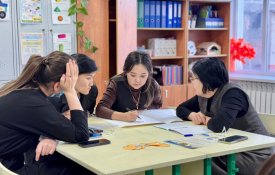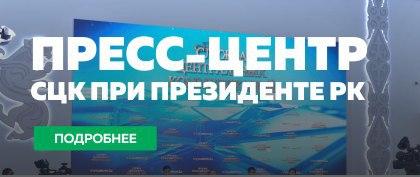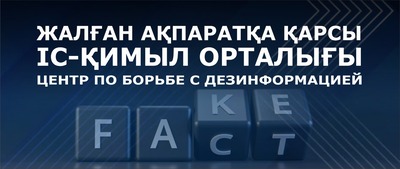On March 16, the president of Kazakhstan, Kassym-Jamart Tokayev, delivered his State of the Nation speech to the joint session of the Houses of Parliament: “New Kazakhstan: Path of Renewal and Modernization.” In many ways, it was a remarkable speech because he didn’t tiptoe around difficult issues facing the nation and showed few signs of hyperbole or artificiality.
With January’s failed attempted coup d’état fresh in everyone’s mind (for more insight, see my article High Noon in Almaty), Tokayev with gravitas emphasized to his listeners the urgency and seriousness of addressing the business of reforming government and bringing about genuine socio-economic development.
Clearly resolute, Tokayev emphasized that sustainable socio-economic development at all levels of society will only be possible through radical reforms to Kazakhstan’s ossified political and economic structures.
A New Kazakhstan
To create a “New Kazakhstan,” Tokayev said, will take much more than technical savvy and bureaucratic skills. In his speech, he appealed to human ingenuity and common sense, and decidedly seemed to put forward that there will be no room for pie-in-the-sky ideological frameworks that are unfair, disruptive, and even dehumanizing to the people of Kazakhstan.
“The people do not need abstract ideas or promises, but rather tangible changes for the better,” he said.
Tokayev wants change to the existing economic order. Targeting not only financial structures of exchange but the “VIPs” themselves (the oligarchs and political class who have been looting the country), he said, “Those who were accustomed to relying on behind-the-scenes schemes are panicking [because they are] losing their privileges and sources of income.” He couldn’t have been much clearer.
Tokayev’s warning to “VIPs” and their glad-handers in and outside of government was no empty theater. He aims to clamp down on ingrained structures of fraud and eliminate “the practice of declaring success [in government] when in reality untrue.” He said in effect: Be en garde, as the days of “business as usual” are over.
In other words, Tokayev, in a Central Asian way of looking at things, is saying that an economic system that is largely dominated by a corrupt political class cannot exist for the sake of the few. He rejects any policies (or economic activity) that lead to exclusion, elevate poverty, or disrupt peaceful co-existence within Kazakhstan’s multicultural, multi-faith, and multi-ethnic society.
Alternative road to prosperity
A close reading of Tokayev’s speech suggests that, in addition to reducing corruption, he also rejects neoliberalism – the economic model that idolizes “the market” as it supposedly “works its magic” to bring about “prosperity” with the help of enlightened financiers and politicians.
If neoliberalism reduces the human person to a “Homo economicus,” or to the view that a person’s social behavior is mostly determined by economic goals and rational behavior, Kazakhstan prefers a different approach. And if neoliberalism justifies the handover of a person’s humanity (the process of dehumanization) to the financial elites for the sake of some future economic paradise, Kazakhstan wants nothing to do with it.
Tokayev simply doesn’t buy neoliberalism. Rather, he emphasizes that the successful reform of government (central and regional) and effective economic relationships depends on more classical approaches to maintaining a healthy society.
As such, he calls upon the people, and the business elites (a harder task), to embrace the classical virtues of “patience, wisdom and endurance,” which, if adopted, will help to bring about greater economic prosperity.
Pinning one’s hopes on market forces and the prattle of unhinged business elites has proved reckless, Tokayev says.
The president’s speech elevates cultural mores and fundamental principles of morality – common sense must drive statecraft rather than ideology – above the dehumanizing idea of a person as a means of production or source of demand for goods and services. The “New Kazakhstan” cannot be built on a theory of economics that simply rewards privilege to the exclusion of the good of the whole human person.
Transformation
To transform society, Tokayev wants to chip away at the malady of speculation, a dysfunctional judicial system and nepotism (terms he uses) and to “permanently eliminate all artificial monopolies both in the economy and politics.”
“Monopoly,” he says, “leads to various societal maladies.” He slammed oligarchs who have amassed resources and wealth at the expense of the common good of the citizens of Kazakhstan.
As this process of fundamental reform unfolds, the media, Tokayev insists, must be responsible, that is, “As an effective channel of communication between the authorities and the people, the media can and should raise pressing issues. But this should be done with great civic responsibility, not working on orders from outside, contributing to the polarization of our society, and not for shady fees, participating in a hidden struggle of political clans.”
Tokayev understands that the goal of decentralizing Kazakhstan’s political structures and “de-cronyizing” economic relationships will not be a cakewalk but rather chock full of difficulties and challenges because of entrenched domestic interests and unidentified (he surely knows who) external meddling.
Unity and solidarity
The deeper point of Tokayev’s speech, however, is to reinforce the idea that national “unity and solidarity” are preconditions for socio-economic and political maturation and, ultimately, indispensable ingredients for a stable and healthy society. Any forces, domestic or foreign, that aim to introduce destabilizing and divisive policies or invoices are unwelcome.
“We can lose everything if we do not maintain unity,” Tokayev said.
While not saying it directly, Tokayev put everyone on notice that Kazakhstan will take on the reform process in its own way, the Central Asian way, not falling victim to “the cult of consumerism and corruption,” or for that matter any external bullying.
As such, Tokayev put it simply: “We need to understand that no one from outside will do anything for us. Everything is in our hands.”
Ideologues, especially from the neoliberal political class, should recognize that Kazakhstan’s path to socio-economic and political development will not be the same as before.
And so, Tokayev will be fully engaged in Kazakhstan’s transformation process while wary of wise men bearing gifts of gold, frankincense and myrrh as a panacea to cure the country’s political and economic ills.
JAVIER M. PIEDRA
Javier M Piedra is a financial consultant,
specialist in international development and former deputy assistant administrator for South and Central Asia at USAID.



